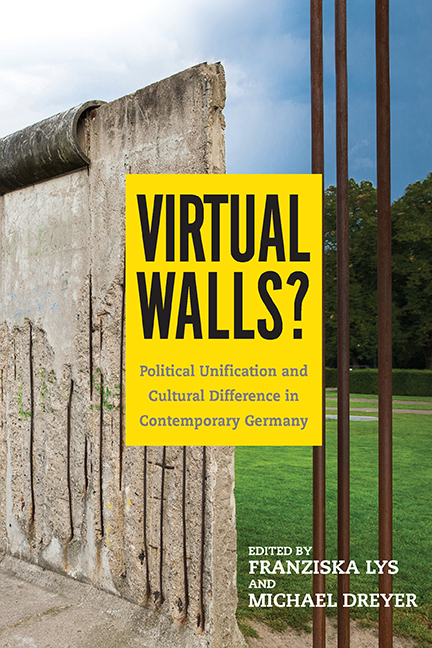Book contents
- Frontmatter
- Dedication
- Contents
- Acknowledgments
- Introduction: United Politics—Divided Culture?
- Part I What Remains: History and the Constitution
- Part II What and How Do We Remember? Literature, Film, and Exhibitions
- Part III A Changing Reception: Painting, Orchestras, and Theaters
- Part IV A Virtual Wall? Education and Society
- Epilogue: The Wende and the End of “the German Problem”
- Notes on the Contributors
- Index
Introduction: United Politics—Divided Culture?
Published online by Cambridge University Press: 24 August 2019
- Frontmatter
- Dedication
- Contents
- Acknowledgments
- Introduction: United Politics—Divided Culture?
- Part I What Remains: History and the Constitution
- Part II What and How Do We Remember? Literature, Film, and Exhibitions
- Part III A Changing Reception: Painting, Orchestras, and Theaters
- Part IV A Virtual Wall? Education and Society
- Epilogue: The Wende and the End of “the German Problem”
- Notes on the Contributors
- Index
Summary
From a Divided to a Unified Germany
ON OCTOBER 30, 1990, PRECISELY AT MIDNIGHT, the flag of a reunited Germany was raised over the Reichstag in Berlin, accompanied by celebratory fireworks across the city. This act signaled the end of one state, the German Democratic Republic (GDR), and the continuation of another, the Federal Republic of Germany (FRG), albeit slightly enlarged: the five new federal states comprising the former GDR were united with the Federal Republic and adopted its legal, political, and economic structures. Hence, the GDR had officially ceased to exist.
There is no doubt that the events leading up to the collapse of the GDR and the subsequent process of unification were challenging: East and West Germany were socialized in quite different ways, and especially for the people in the East, life as they knew it changed completely: economically, politically, ideologically, socially, and culturally. Wolfgang Thierse, an East German citizen before unification and later the president of the German Bundestag, described it in the following way during a speech on the occasion of the twenty-fifth anniversary of the fall of the Wall: “When a strong, successful community and a failed, collapsed, rejected system come together, then the weights are clearly distributed: One is the norm which the others have to take over; one is the teacher, the other the apprentice; in the case of the one, everything can stay as is; in the case of the other, everything has to change; German unity is for some the confirmation of the status quo, for the others it causes a radical upheaval.” It is clear that the process of growing together was experienced differently by East and West Germans: While many East Germans initially felt heightened optimism for freedom and a less complicated life than the GDR offered, the process of unification was overshadowed by uncertainty, doubt, vulnerability, mourning, and a sense of loss that brought about a yearning (especially among the older GDR generation) for the small, familiar country in which they had grown up and a sense of nostalgia for the former GDR that became known as Ostalgie. But it was also difficult for West Germans: many felt that they were carrying a disproportionate share of the cost for integrating the two former states.
- Type
- Chapter
- Information
- Virtual Walls?Political Unification and Cultural Difference in Contemporary Germany, pp. 1 - 16Publisher: Boydell & BrewerPrint publication year: 2017



